新概念第三册Lesson 36 A chance in a million讲义
文档属性
| 名称 | 新概念第三册Lesson 36 A chance in a million讲义 | 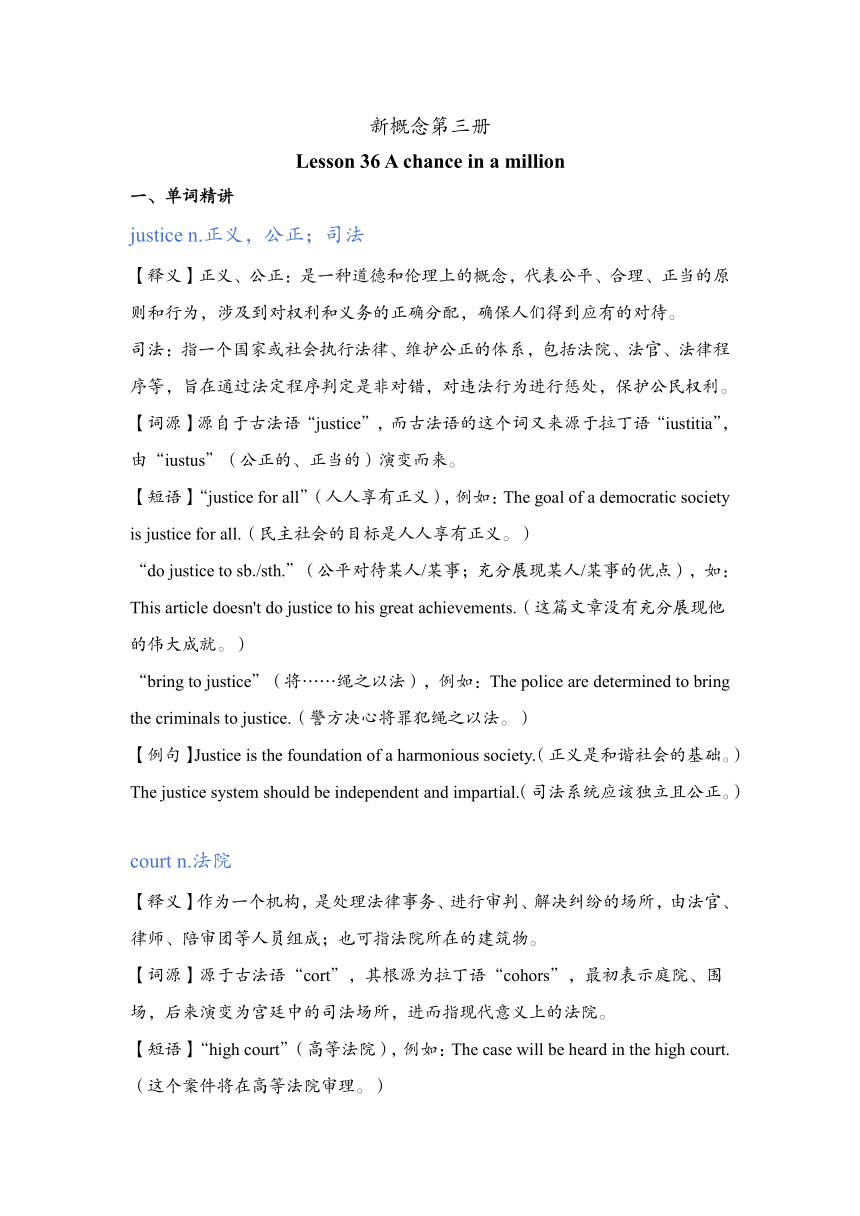 | |
| 格式 | docx | ||
| 文件大小 | 478.1KB | ||
| 资源类型 | 教案 | ||
| 版本资源 | 新概念英语 | ||
| 科目 | 英语 | ||
| 更新时间 | 2024-12-05 09:11:45 | ||
图片预览

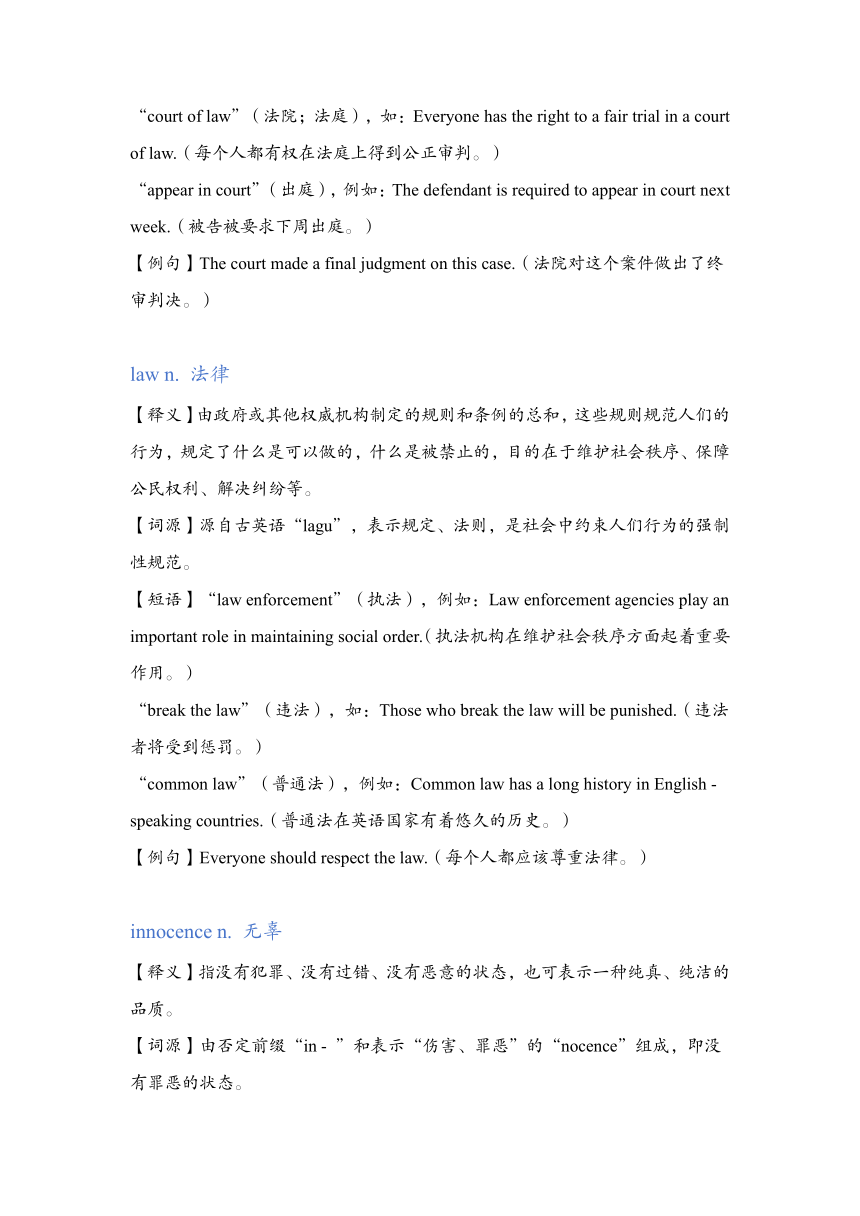
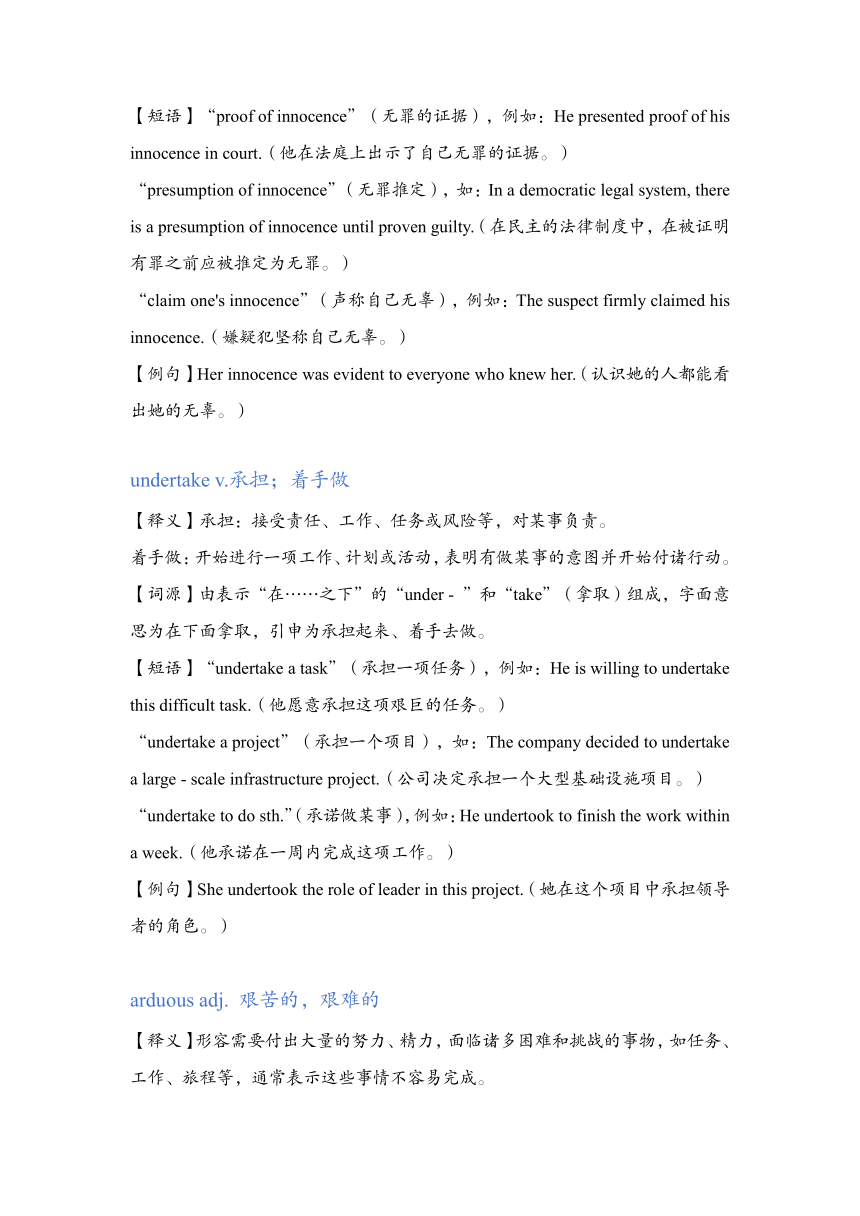
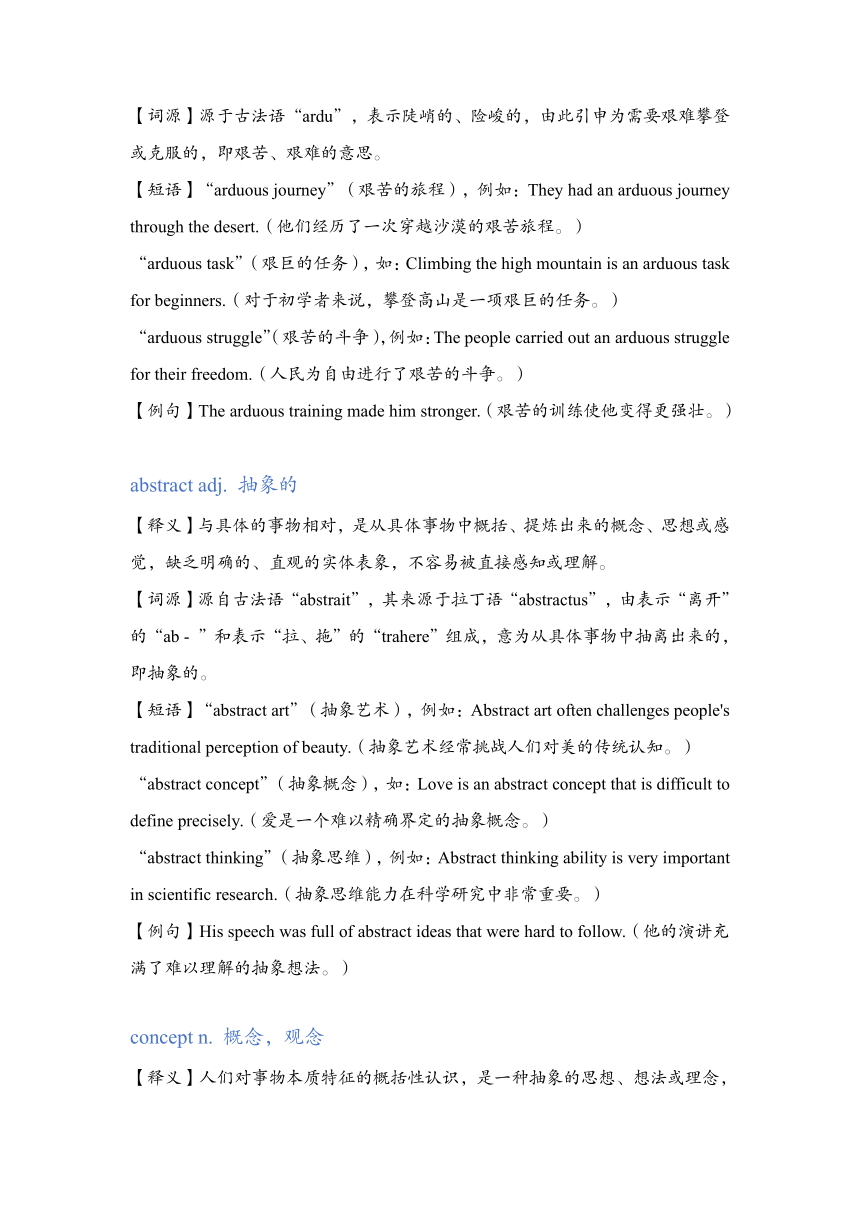
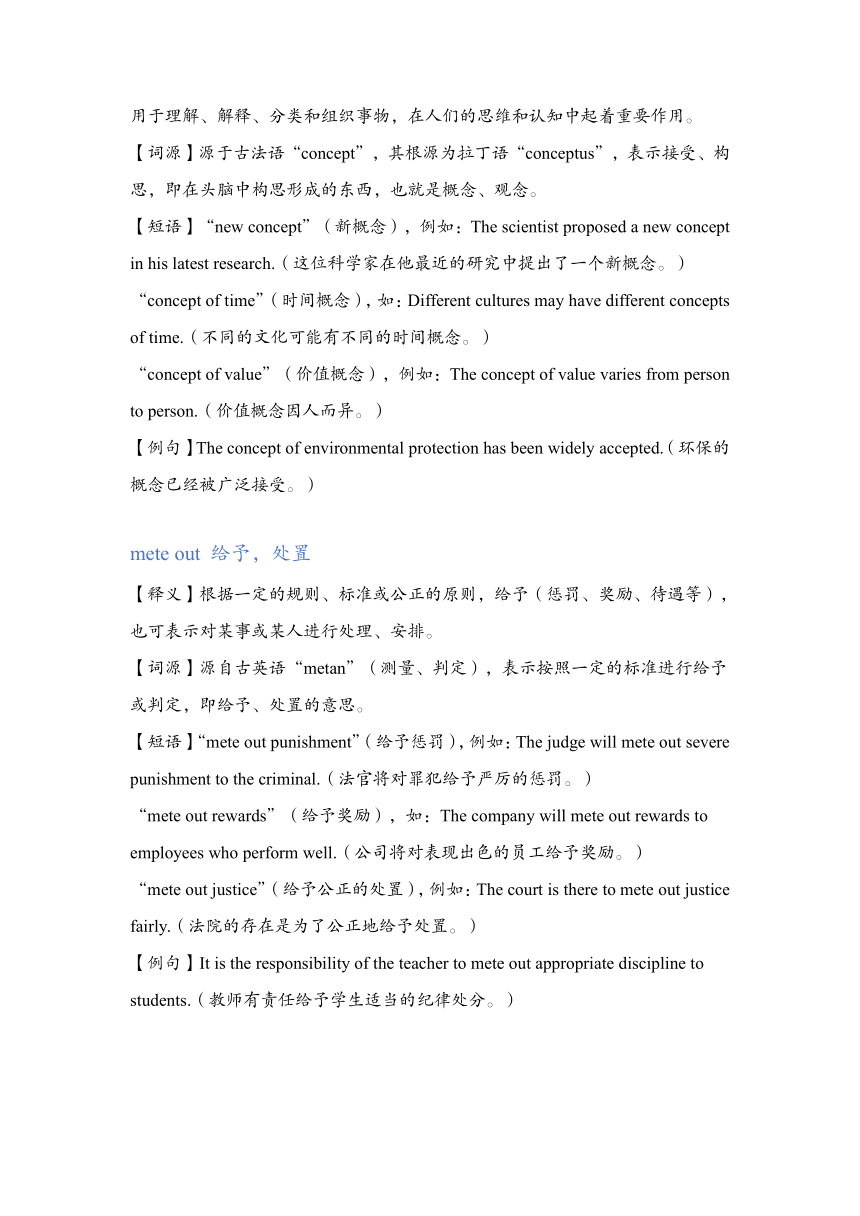
文档简介
新概念第三册
Lesson 36 A chance in a million
单词精讲
justice n.正义,公正;司法
【释义】正义、公正:是一种道德和伦理上的概念,代表公平、合理、正当的原则和行为,涉及到对权利和义务的正确分配,确保人们得到应有的对待。
司法:指一个国家或社会执行法律、维护公正的体系,包括法院、法官、法律程序等,旨在通过法定程序判定是非对错,对违法行为进行惩处,保护公民权利。
【词源】源自于古法语“justice”,而古法语的这个词又来源于拉丁语“iustitia”,由“iustus”(公正的、正当的)演变而来。
【短语】“justice for all”(人人享有正义),例如:The goal of a democratic society is justice for all.(民主社会的目标是人人享有正义。)
“do justice to sb./sth.”(公平对待某人/某事;充分展现某人/某事的优点),如:This article doesn't do justice to his great achievements.(这篇文章没有充分展现他的伟大成就。)
“bring to justice”(将……绳之以法),例如:The police are determined to bring the criminals to justice.(警方决心将罪犯绳之以法。)
【例句】Justice is the foundation of a harmonious society.(正义是和谐社会的基础。)
The justice system should be independent and impartial.(司法系统应该独立且公正。)
court n.法院
【释义】作为一个机构,是处理法律事务、进行审判、解决纠纷的场所,由法官、律师、陪审团等人员组成;也可指法院所在的建筑物。
【词源】源于古法语“cort”,其根源为拉丁语“cohors”,最初表示庭院、围场,后来演变为宫廷中的司法场所,进而指现代意义上的法院。
【短语】“high court”(高等法院),例如:The case will be heard in the high court.(这个案件将在高等法院审理。)
“court of law”(法院;法庭),如:Everyone has the right to a fair trial in a court of law.(每个人都有权在法庭上得到公正审判。)
“appear in court”(出庭),例如:The defendant is required to appear in court next week.(被告被要求下周出庭。)
【例句】The court made a final judgment on this case.(法院对这个案件做出了终审判决。)
law n. 法律
【释义】由政府或其他权威机构制定的规则和条例的总和,这些规则规范人们的行为,规定了什么是可以做的,什么是被禁止的,目的在于维护社会秩序、保障公民权利、解决纠纷等。
【词源】源自古英语“lagu”,表示规定、法则,是社会中约束人们行为的强制性规范。
【短语】“law enforcement”(执法),例如:Law enforcement agencies play an important role in maintaining social order.(执法机构在维护社会秩序方面起着重要作用。)
“break the law”(违法),如:Those who break the law will be punished.(违法者将受到惩罚。)
“common law”(普通法),例如:Common law has a long history in English - speaking countries.(普通法在英语国家有着悠久的历史。)
【例句】Everyone should respect the law.(每个人都应该尊重法律。)
innocence n. 无辜
【释义】指没有犯罪、没有过错、没有恶意的状态,也可表示一种纯真、纯洁的品质。
【词源】由否定前缀“in - ”和表示“伤害、罪恶”的“nocence”组成,即没有罪恶的状态。
【短语】“proof of innocence”(无罪的证据),例如:He presented proof of his innocence in court.(他在法庭上出示了自己无罪的证据。)
“presumption of innocence”(无罪推定),如:In a democratic legal system, there is a presumption of innocence until proven guilty.(在民主的法律制度中,在被证明有罪之前应被推定为无罪。)
“claim one's innocence”(声称自己无辜),例如:The suspect firmly claimed his innocence.(嫌疑犯坚称自己无辜。)
【例句】Her innocence was evident to everyone who knew her.(认识她的人都能看出她的无辜。)
undertake v.承担;着手做
【释义】承担:接受责任、工作、任务或风险等,对某事负责。
着手做:开始进行一项工作、计划或活动,表明有做某事的意图并开始付诸行动。
【词源】由表示“在……之下”的“under - ”和“take”(拿取)组成,字面意思为在下面拿取,引申为承担起来、着手去做。
【短语】“undertake a task”(承担一项任务),例如:He is willing to undertake this difficult task.(他愿意承担这项艰巨的任务。)
“undertake a project”(承担一个项目),如:The company decided to undertake a large - scale infrastructure project.(公司决定承担一个大型基础设施项目。)
“undertake to do sth.”(承诺做某事),例如:He undertook to finish the work within a week.(他承诺在一周内完成这项工作。)
【例句】She undertook the role of leader in this project.(她在这个项目中承担领导者的角色。)
arduous adj. 艰苦的,艰难的
【释义】形容需要付出大量的努力、精力,面临诸多困难和挑战的事物,如任务、工作、旅程等,通常表示这些事情不容易完成。
【词源】源于古法语“ardu”,表示陡峭的、险峻的,由此引申为需要艰难攀登或克服的,即艰苦、艰难的意思。
【短语】“arduous journey”(艰苦的旅程),例如:They had an arduous journey through the desert.(他们经历了一次穿越沙漠的艰苦旅程。)
“arduous task”(艰巨的任务),如:Climbing the high mountain is an arduous task for beginners.(对于初学者来说,攀登高山是一项艰巨的任务。)
“arduous struggle”(艰苦的斗争),例如:The people carried out an arduous struggle for their freedom.(人民为自由进行了艰苦的斗争。)
【例句】The arduous training made him stronger.(艰苦的训练使他变得更强壮。)
abstract adj. 抽象的
【释义】与具体的事物相对,是从具体事物中概括、提炼出来的概念、思想或感觉,缺乏明确的、直观的实体表象,不容易被直接感知或理解。
【词源】源自古法语“abstrait”,其来源于拉丁语“abstractus”,由表示“离开”的“ab - ”和表示“拉、拖”的“trahere”组成,意为从具体事物中抽离出来的,即抽象的。
【短语】“abstract art”(抽象艺术),例如:Abstract art often challenges people's traditional perception of beauty.(抽象艺术经常挑战人们对美的传统认知。)
“abstract concept”(抽象概念),如:Love is an abstract concept that is difficult to define precisely.(爱是一个难以精确界定的抽象概念。)
“abstract thinking”(抽象思维),例如:Abstract thinking ability is very important in scientific research.(抽象思维能力在科学研究中非常重要。)
【例句】His speech was full of abstract ideas that were hard to follow.(他的演讲充满了难以理解的抽象想法。)
concept n. 概念,观念
【释义】人们对事物本质特征的概括性认识,是一种抽象的思想、想法或理念,用于理解、解释、分类和组织事物,在人们的思维和认知中起着重要作用。
【词源】源于古法语“concept”,其根源为拉丁语“conceptus”,表示接受、构思,即在头脑中构思形成的东西,也就是概念、观念。
【短语】“new concept”(新概念),例如:The scientist proposed a new concept in his latest research.(这位科学家在他最近的研究中提出了一个新概念。)
“concept of time”(时间概念),如:Different cultures may have different concepts of time.(不同的文化可能有不同的时间概念。)
“concept of value”(价值概念),例如:The concept of value varies from person to person.(价值概念因人而异。)
【例句】The concept of environmental protection has been widely accepted.(环保的概念已经被广泛接受。)
mete out 给予,处置
【释义】根据一定的规则、标准或公正的原则,给予(惩罚、奖励、待遇等),也可表示对某事或某人进行处理、安排。
【词源】源自古英语“metan”(测量、判定),表示按照一定的标准进行给予或判定,即给予、处置的意思。
【短语】“mete out punishment”(给予惩罚),例如:The judge will mete out severe punishment to the criminal.(法官将对罪犯给予严厉的惩罚。)
“mete out rewards”(给予奖励),如:The company will mete out rewards to employees who perform well.(公司将对表现出色的员工给予奖励。)
“mete out justice”(给予公正的处置),例如:The court is there to mete out justice fairly.(法院的存在是为了公正地给予处置。)
【例句】It is the responsibility of the teacher to mete out appropriate discipline to students.(教师有责任给予学生适当的纪律处分。)
interference n. 干涉
【释义】指介入他人事务、干扰某事正常进行或影响事物自然发展的行为,通常带有不必要、不恰当或未经授权的含义。
【词源】由表示“在……之间”的“inter - ”、表示“带来”的“fer - ”和名词后缀“ - ence”组成,表示在事物之间带来影响,即干涉的意思。
【短语】“interference in”(干涉……),例如:We oppose any interference in our internal affairs.(我们反对任何对我们内政的干涉。)
“interference with”(干扰……;妨碍……),如:The electromagnetic interference with the equipment caused some problems.(对设备的电磁干扰导致了一些问题。)
“government interference”(政府干涉),例如:Some people think that too much government interference in the economy is not good.(有些人认为政府对经济过多的干涉不好。)
【例句】His interference in the negotiation made the situation more complicated.(他对谈判的干涉使情况变得更复杂了。)
accord n. 一致
【释义】表示在意见、态度、行动、标准等方面的和谐、统一、相符,体现出各方之间没有分歧或矛盾。
【词源】源于古法语“accord”,其根源为拉丁语“accordare”,由表示“向”的“ad - ”和表示“心”的“cord - ”组成,意为心心相印,即一致的意思。
【短语】“in accord with”(与……一致),例如:His actions are in accord with his words.(他的行动与他的话语一致。)
“reach an accord”(达成一致),如:After long - time discussion, they finally reached an accord.(经过长时间的讨论,他们最终达成了一致。)
“accord of opinions”(意见一致),例如:There is an accord of opinions among the team members.(团队成员之间意见一致。)
【例句】The two sides are in complete accord on this issue.(双方在这个问题上完全一致。)
premises n.房屋
【释义】指包括土地、建筑物及其附属设施等在内的整个房产,可用于居住、商业、办公等多种用途。
【词源】源自古法语“premisse”,其根源为拉丁语“praemissus”,表示在前面放置的,这里表示房产等固定的财产。
【短语】“business premises”(商业用房),例如:The company is looking for new business premises.(这家公司正在寻找新的商业用房。)
“residential premises”(住宅房屋),如:The rent of residential premises in this area is relatively high.(这个地区的住宅房屋租金相对较高。)
“on the premises”(在房屋内;在场所内),例如:There is a small garden on the premises.(房屋内有一个小花园。)
【例句】The police searched the premises thoroughly but found no evidence.(警察彻底搜查了房屋但没有发现证据。)
convert v.转变,改变
【释义】使(事物、人等)从一种形式、状态、用途、信仰等转变为另一种,涉及到物理、化学、社会、思想等多个领域的变化。
【词源】源自古法语“convertir”,其根源为拉丁语“convertere”,由表示“完全”的“con - ”和表示“转”的“vertere”组成,表示完全转变。
【短语】“convert into”(把……转变成),例如:We can convert waste into useful resources.(我们可以把废物转变成有用的资源。)
“convert to”(转变为;皈依),如:He decided to convert to Buddhism.(他决定皈依佛教。)
“convert sth. from A to B”(把某物从A转变为B),例如:The factory can convert raw materials from one form to another.(这家工厂可以把原材料从一种形式转变为另一种形式。)
【例句】The technology can convert solar energy into electricity.(这项技术可以将太阳能转化为电能。)
disused adj.不再用的,废弃的
【释义】表示曾经被使用过,但现在不再被使用的状态,常用来形容建筑物、设备、道路等实体事物。
【词源】由表示否定的“dis - ”和“used”(使用)组成,表示不被使用的,即废弃的意思。
【短语】“disused factory”(废弃的工厂),例如:The disused factory has become a shelter for stray animals.(废弃的工厂成了流浪动物的栖息地。)
“disused railway”(废弃的铁路),如:The disused railway is now a popular place for walkers.(废弃的铁路现在是徒步旅行者喜欢的地方。)
“disused well”(废弃的井),例如:They found a disused well in the old village.(他们在旧村庄里发现了一口废弃的井。)
【例句】The disused building was in a dilapidated state.(这座废弃的建筑破败不堪。)
fireplace n.壁炉
【释义】建筑物内专门用于生火取暖的地方,通常由炉膛、烟囱等部分组成,也是室内的一种取暖和装饰设施。
【词源】由“fire”(火)和“place”(地方)组成,表示生火的地方,即壁炉。
【短语】“wood - burning fireplace”(燃木壁炉),例如:The living room has a beautiful wood - burning fireplace.(客厅有一个漂亮的燃木壁炉。)
“gas fireplace”(燃气壁炉),如:A gas fireplace is more convenient than a traditional one.(燃气壁炉比传统壁炉更方便。)
“clean the fireplace”(清理壁炉),例如:You should clean the fireplace regularly to prevent fire hazards.(你应该定期清理壁炉以防止火灾隐患。)
【例句】They sat around the fireplace, enjoying the warmth.(他们围坐在壁炉旁享受温暖。)
muffle v.捂住,厌抑
【释义】作动词时,主要表示“使(声音)降低;使(声音)听不清;捂住,蒙住(头部或耳朵)”,例如:She put her hand over her mouth to muffle her cough.(她用手捂住嘴以压低咳嗽声。)也可表示“压抑(感情等);抑制(行动等)”,如:He tried to muffle his anger.(他试图抑制自己的愤怒。)
【词源】源自古法语“moufler”,最初的意思是“把脸裹起来”,可能来自于俗拉丁语“muffulare”,与“muff”(手笼、袖套)有关,因为把手笼之类的东西围在脸上可以捂住声音或保暖等,逐渐发展出现在的这些含义。
【短语】muffle up:裹住,包住;把…裹起来,例如:Muffle up well in this cold weather.(在这种寒冷天气里要把自己裹暖和。)
【例句】The thick walls muffle the noise from the street.(厚墙降低了来自街道的噪音。)
She muffle d her face with a scarf to protect it from the cold wind.(她用围巾蒙住脸以抵御寒风。)
二、课文精讲
1.We are less credulous than we used to be. 我们不再像以往那样轻易相信别人了。
less…than引导比较状语从句。
used to be的意思是“过去曾经是”。
2.In the nineteenth century, a novelist would bring his story to a conclusion by presenting his readers with a series of coincidences—most of them wildly improbable. 在19世纪,小说家常在小说结尾处给读者准备一系列的巧合—大部分是牵强附会,极不可能的。
by presenting his readers with a series of coincidences作方式状语,交代如何“给小说结尾”,破折号后面的内容起进一步解释说明的作用。
wildly improbable的意思是“极其不可能的”,比impossible的程度更深。
3.Readers happily accepted the fact that an obscure maidservant was really the hero's mother.当时的读者却愉快地接受这样一些事实,一个低贱的女佣实际上是主人公的母亲。
that引导同位语从句,解释说明fact是什么。
请特别注意,本句中的hero不做“英雄”来理解,而是指“主人公”。
4.A long-lost brother, who was presumed dead, was really alive all the time and wickedly plotting to bring about the hero's downfall.主人公一位长期失散的兄弟,大家都以为死了,实际上一直活着,并且正在策划暗算主人公。
语言点:句子结构分析:who引导非限制性定语从句,进一步说明是怎样的一个兄弟。
5.And so on.如此等等。
这个句子起承上启下的作用,没有什么实际意义。
6.Modern readers would find such naive solutions totally unacceptable.现代读者会觉得这种天真的结局完全无法接受。
unacceptable作宾语such naive solutions的补足语。
7.Yet, in real life, circumstances do sometimes conspire to bring about coincidences which anyone but a nineteenth century novelist would find incredible.不过,在现实生活中,有时确实会出现一些巧合,这些巧合除了19世纪小说家外谁也不会相信。
which引导定语从句,修饰先行词coincidences,说明巧合是什么。
do sometimes conspire中的do为助动词,对谓语conspire起强调作用。
but不表示“但是”,而是作“除…之外”来理解。
8.When I was a boy, my grandfather told me how a German taxi driver, Franz Bussman, found a brother who was thought to have been killed twenty years before.当我是个孩子的时候,我祖父给我讲了一位德国出租汽车司机弗朗兹。巴斯曼如何找到了据信已在20年前死去的兄弟的事。
when引导时间状语从句。主句中的Franz Bussman是a German taxi driver的同位语。Who引导定语从句,修饰brother。
9.While on a walking tour with his wife, he stopped to talk to a workman.一次, 他与妻子徒步旅行。途中,停下来与一个工人交谈。
While on a walking tour with his wife放在句首,是一个省略式的时间状语从句,可还原为:while he was on a walking tour with his wife。
10.A few days later, she sent a boy to the workman to ask him if his name was Hans Bussman.几天后,她派了一个男孩去问那人是否叫汉斯.巴斯曼。
动词不定式短语to ask…作目的状语,即“派男孩去目的地是为了让他去问…”
if his name was Hans Bussman为宾语从句,作ask的直接宾语,him是间接宾语。
11.Needless to say, the man's name was Hans Bussman and he really was Franz's long-lost brother.不出巴斯曼夫人所料,那人的名字真是汉斯.巴斯曼,他确实是弗朗兹失散多年的兄弟。
nedless to say是一个非常重要的表达。
12. When the brothers were reunited, Hans explained how it was that he was still alive.兄弟俩团聚之时,汉斯说明了他活下来的经过。
when引导时间状语从句。how it was that he was still alive为宾语从句,说明explained的内容,其中it是形式主语,that引导的从句是真正的主语,这句话改写成正常语序应该是he was still alive was how。
注意were reunited不可译为“被团圆”,而应译为主动语态。
13. After having been wounded towards the end of the war, he had been sent to hospital and was separated from his unit.战争即将结束时,他负伤被送进医院,并与部队失去联系。
be separated from的意思是“被与…分开”。
14. The hospital had been bombed and Hans had made his way back into Western Germany on foot.医院遭到轰炸,汉斯步行回到了西德。
make one's way back into的意思是“设法返回…”(即回到以前生活的地方)。
15. Meanwhile, his unit was lost and all records of him had been destroyed.与此同时,他所在部队被击溃,他的所有档案材料全部毁于战火。
was lost本意为“不见了,找不到了”,在此引申为“被击溃”。
had been destroyed强调战争的严酷性,造成的毁坏几乎无法修复。
16. Hans returned to his family home, but the house had been bombed and no one in the neighbourhood knew what had become of the inhabitants.汉斯重返故里,但他的家已被炸毁,左邻右舍谁也不知原住户的下落。
句子结构分析:but后面的分句说明汉斯返回家乡后看到的情景。What引导宾语从句。
family home的意思是“故里,老家”,相当于hometown。
become of在此理解为“遭受的情况是…”。
17. Assuming that his family had been killed during an air raid, Hans settled down in a village fifty miles away where he had remained ever since.汉斯以为全家人都在空袭中遇难,于是便在距此50英里外的一座村子里定居下来,直至当日。
fifty miles away作village的后置定语,说明村子有多远。
settle down的意思是“定居”(长期居住在某地而不随意搬家)。
Lesson 36 A chance in a million
单词精讲
justice n.正义,公正;司法
【释义】正义、公正:是一种道德和伦理上的概念,代表公平、合理、正当的原则和行为,涉及到对权利和义务的正确分配,确保人们得到应有的对待。
司法:指一个国家或社会执行法律、维护公正的体系,包括法院、法官、法律程序等,旨在通过法定程序判定是非对错,对违法行为进行惩处,保护公民权利。
【词源】源自于古法语“justice”,而古法语的这个词又来源于拉丁语“iustitia”,由“iustus”(公正的、正当的)演变而来。
【短语】“justice for all”(人人享有正义),例如:The goal of a democratic society is justice for all.(民主社会的目标是人人享有正义。)
“do justice to sb./sth.”(公平对待某人/某事;充分展现某人/某事的优点),如:This article doesn't do justice to his great achievements.(这篇文章没有充分展现他的伟大成就。)
“bring to justice”(将……绳之以法),例如:The police are determined to bring the criminals to justice.(警方决心将罪犯绳之以法。)
【例句】Justice is the foundation of a harmonious society.(正义是和谐社会的基础。)
The justice system should be independent and impartial.(司法系统应该独立且公正。)
court n.法院
【释义】作为一个机构,是处理法律事务、进行审判、解决纠纷的场所,由法官、律师、陪审团等人员组成;也可指法院所在的建筑物。
【词源】源于古法语“cort”,其根源为拉丁语“cohors”,最初表示庭院、围场,后来演变为宫廷中的司法场所,进而指现代意义上的法院。
【短语】“high court”(高等法院),例如:The case will be heard in the high court.(这个案件将在高等法院审理。)
“court of law”(法院;法庭),如:Everyone has the right to a fair trial in a court of law.(每个人都有权在法庭上得到公正审判。)
“appear in court”(出庭),例如:The defendant is required to appear in court next week.(被告被要求下周出庭。)
【例句】The court made a final judgment on this case.(法院对这个案件做出了终审判决。)
law n. 法律
【释义】由政府或其他权威机构制定的规则和条例的总和,这些规则规范人们的行为,规定了什么是可以做的,什么是被禁止的,目的在于维护社会秩序、保障公民权利、解决纠纷等。
【词源】源自古英语“lagu”,表示规定、法则,是社会中约束人们行为的强制性规范。
【短语】“law enforcement”(执法),例如:Law enforcement agencies play an important role in maintaining social order.(执法机构在维护社会秩序方面起着重要作用。)
“break the law”(违法),如:Those who break the law will be punished.(违法者将受到惩罚。)
“common law”(普通法),例如:Common law has a long history in English - speaking countries.(普通法在英语国家有着悠久的历史。)
【例句】Everyone should respect the law.(每个人都应该尊重法律。)
innocence n. 无辜
【释义】指没有犯罪、没有过错、没有恶意的状态,也可表示一种纯真、纯洁的品质。
【词源】由否定前缀“in - ”和表示“伤害、罪恶”的“nocence”组成,即没有罪恶的状态。
【短语】“proof of innocence”(无罪的证据),例如:He presented proof of his innocence in court.(他在法庭上出示了自己无罪的证据。)
“presumption of innocence”(无罪推定),如:In a democratic legal system, there is a presumption of innocence until proven guilty.(在民主的法律制度中,在被证明有罪之前应被推定为无罪。)
“claim one's innocence”(声称自己无辜),例如:The suspect firmly claimed his innocence.(嫌疑犯坚称自己无辜。)
【例句】Her innocence was evident to everyone who knew her.(认识她的人都能看出她的无辜。)
undertake v.承担;着手做
【释义】承担:接受责任、工作、任务或风险等,对某事负责。
着手做:开始进行一项工作、计划或活动,表明有做某事的意图并开始付诸行动。
【词源】由表示“在……之下”的“under - ”和“take”(拿取)组成,字面意思为在下面拿取,引申为承担起来、着手去做。
【短语】“undertake a task”(承担一项任务),例如:He is willing to undertake this difficult task.(他愿意承担这项艰巨的任务。)
“undertake a project”(承担一个项目),如:The company decided to undertake a large - scale infrastructure project.(公司决定承担一个大型基础设施项目。)
“undertake to do sth.”(承诺做某事),例如:He undertook to finish the work within a week.(他承诺在一周内完成这项工作。)
【例句】She undertook the role of leader in this project.(她在这个项目中承担领导者的角色。)
arduous adj. 艰苦的,艰难的
【释义】形容需要付出大量的努力、精力,面临诸多困难和挑战的事物,如任务、工作、旅程等,通常表示这些事情不容易完成。
【词源】源于古法语“ardu”,表示陡峭的、险峻的,由此引申为需要艰难攀登或克服的,即艰苦、艰难的意思。
【短语】“arduous journey”(艰苦的旅程),例如:They had an arduous journey through the desert.(他们经历了一次穿越沙漠的艰苦旅程。)
“arduous task”(艰巨的任务),如:Climbing the high mountain is an arduous task for beginners.(对于初学者来说,攀登高山是一项艰巨的任务。)
“arduous struggle”(艰苦的斗争),例如:The people carried out an arduous struggle for their freedom.(人民为自由进行了艰苦的斗争。)
【例句】The arduous training made him stronger.(艰苦的训练使他变得更强壮。)
abstract adj. 抽象的
【释义】与具体的事物相对,是从具体事物中概括、提炼出来的概念、思想或感觉,缺乏明确的、直观的实体表象,不容易被直接感知或理解。
【词源】源自古法语“abstrait”,其来源于拉丁语“abstractus”,由表示“离开”的“ab - ”和表示“拉、拖”的“trahere”组成,意为从具体事物中抽离出来的,即抽象的。
【短语】“abstract art”(抽象艺术),例如:Abstract art often challenges people's traditional perception of beauty.(抽象艺术经常挑战人们对美的传统认知。)
“abstract concept”(抽象概念),如:Love is an abstract concept that is difficult to define precisely.(爱是一个难以精确界定的抽象概念。)
“abstract thinking”(抽象思维),例如:Abstract thinking ability is very important in scientific research.(抽象思维能力在科学研究中非常重要。)
【例句】His speech was full of abstract ideas that were hard to follow.(他的演讲充满了难以理解的抽象想法。)
concept n. 概念,观念
【释义】人们对事物本质特征的概括性认识,是一种抽象的思想、想法或理念,用于理解、解释、分类和组织事物,在人们的思维和认知中起着重要作用。
【词源】源于古法语“concept”,其根源为拉丁语“conceptus”,表示接受、构思,即在头脑中构思形成的东西,也就是概念、观念。
【短语】“new concept”(新概念),例如:The scientist proposed a new concept in his latest research.(这位科学家在他最近的研究中提出了一个新概念。)
“concept of time”(时间概念),如:Different cultures may have different concepts of time.(不同的文化可能有不同的时间概念。)
“concept of value”(价值概念),例如:The concept of value varies from person to person.(价值概念因人而异。)
【例句】The concept of environmental protection has been widely accepted.(环保的概念已经被广泛接受。)
mete out 给予,处置
【释义】根据一定的规则、标准或公正的原则,给予(惩罚、奖励、待遇等),也可表示对某事或某人进行处理、安排。
【词源】源自古英语“metan”(测量、判定),表示按照一定的标准进行给予或判定,即给予、处置的意思。
【短语】“mete out punishment”(给予惩罚),例如:The judge will mete out severe punishment to the criminal.(法官将对罪犯给予严厉的惩罚。)
“mete out rewards”(给予奖励),如:The company will mete out rewards to employees who perform well.(公司将对表现出色的员工给予奖励。)
“mete out justice”(给予公正的处置),例如:The court is there to mete out justice fairly.(法院的存在是为了公正地给予处置。)
【例句】It is the responsibility of the teacher to mete out appropriate discipline to students.(教师有责任给予学生适当的纪律处分。)
interference n. 干涉
【释义】指介入他人事务、干扰某事正常进行或影响事物自然发展的行为,通常带有不必要、不恰当或未经授权的含义。
【词源】由表示“在……之间”的“inter - ”、表示“带来”的“fer - ”和名词后缀“ - ence”组成,表示在事物之间带来影响,即干涉的意思。
【短语】“interference in”(干涉……),例如:We oppose any interference in our internal affairs.(我们反对任何对我们内政的干涉。)
“interference with”(干扰……;妨碍……),如:The electromagnetic interference with the equipment caused some problems.(对设备的电磁干扰导致了一些问题。)
“government interference”(政府干涉),例如:Some people think that too much government interference in the economy is not good.(有些人认为政府对经济过多的干涉不好。)
【例句】His interference in the negotiation made the situation more complicated.(他对谈判的干涉使情况变得更复杂了。)
accord n. 一致
【释义】表示在意见、态度、行动、标准等方面的和谐、统一、相符,体现出各方之间没有分歧或矛盾。
【词源】源于古法语“accord”,其根源为拉丁语“accordare”,由表示“向”的“ad - ”和表示“心”的“cord - ”组成,意为心心相印,即一致的意思。
【短语】“in accord with”(与……一致),例如:His actions are in accord with his words.(他的行动与他的话语一致。)
“reach an accord”(达成一致),如:After long - time discussion, they finally reached an accord.(经过长时间的讨论,他们最终达成了一致。)
“accord of opinions”(意见一致),例如:There is an accord of opinions among the team members.(团队成员之间意见一致。)
【例句】The two sides are in complete accord on this issue.(双方在这个问题上完全一致。)
premises n.房屋
【释义】指包括土地、建筑物及其附属设施等在内的整个房产,可用于居住、商业、办公等多种用途。
【词源】源自古法语“premisse”,其根源为拉丁语“praemissus”,表示在前面放置的,这里表示房产等固定的财产。
【短语】“business premises”(商业用房),例如:The company is looking for new business premises.(这家公司正在寻找新的商业用房。)
“residential premises”(住宅房屋),如:The rent of residential premises in this area is relatively high.(这个地区的住宅房屋租金相对较高。)
“on the premises”(在房屋内;在场所内),例如:There is a small garden on the premises.(房屋内有一个小花园。)
【例句】The police searched the premises thoroughly but found no evidence.(警察彻底搜查了房屋但没有发现证据。)
convert v.转变,改变
【释义】使(事物、人等)从一种形式、状态、用途、信仰等转变为另一种,涉及到物理、化学、社会、思想等多个领域的变化。
【词源】源自古法语“convertir”,其根源为拉丁语“convertere”,由表示“完全”的“con - ”和表示“转”的“vertere”组成,表示完全转变。
【短语】“convert into”(把……转变成),例如:We can convert waste into useful resources.(我们可以把废物转变成有用的资源。)
“convert to”(转变为;皈依),如:He decided to convert to Buddhism.(他决定皈依佛教。)
“convert sth. from A to B”(把某物从A转变为B),例如:The factory can convert raw materials from one form to another.(这家工厂可以把原材料从一种形式转变为另一种形式。)
【例句】The technology can convert solar energy into electricity.(这项技术可以将太阳能转化为电能。)
disused adj.不再用的,废弃的
【释义】表示曾经被使用过,但现在不再被使用的状态,常用来形容建筑物、设备、道路等实体事物。
【词源】由表示否定的“dis - ”和“used”(使用)组成,表示不被使用的,即废弃的意思。
【短语】“disused factory”(废弃的工厂),例如:The disused factory has become a shelter for stray animals.(废弃的工厂成了流浪动物的栖息地。)
“disused railway”(废弃的铁路),如:The disused railway is now a popular place for walkers.(废弃的铁路现在是徒步旅行者喜欢的地方。)
“disused well”(废弃的井),例如:They found a disused well in the old village.(他们在旧村庄里发现了一口废弃的井。)
【例句】The disused building was in a dilapidated state.(这座废弃的建筑破败不堪。)
fireplace n.壁炉
【释义】建筑物内专门用于生火取暖的地方,通常由炉膛、烟囱等部分组成,也是室内的一种取暖和装饰设施。
【词源】由“fire”(火)和“place”(地方)组成,表示生火的地方,即壁炉。
【短语】“wood - burning fireplace”(燃木壁炉),例如:The living room has a beautiful wood - burning fireplace.(客厅有一个漂亮的燃木壁炉。)
“gas fireplace”(燃气壁炉),如:A gas fireplace is more convenient than a traditional one.(燃气壁炉比传统壁炉更方便。)
“clean the fireplace”(清理壁炉),例如:You should clean the fireplace regularly to prevent fire hazards.(你应该定期清理壁炉以防止火灾隐患。)
【例句】They sat around the fireplace, enjoying the warmth.(他们围坐在壁炉旁享受温暖。)
muffle v.捂住,厌抑
【释义】作动词时,主要表示“使(声音)降低;使(声音)听不清;捂住,蒙住(头部或耳朵)”,例如:She put her hand over her mouth to muffle her cough.(她用手捂住嘴以压低咳嗽声。)也可表示“压抑(感情等);抑制(行动等)”,如:He tried to muffle his anger.(他试图抑制自己的愤怒。)
【词源】源自古法语“moufler”,最初的意思是“把脸裹起来”,可能来自于俗拉丁语“muffulare”,与“muff”(手笼、袖套)有关,因为把手笼之类的东西围在脸上可以捂住声音或保暖等,逐渐发展出现在的这些含义。
【短语】muffle up:裹住,包住;把…裹起来,例如:Muffle up well in this cold weather.(在这种寒冷天气里要把自己裹暖和。)
【例句】The thick walls muffle the noise from the street.(厚墙降低了来自街道的噪音。)
She muffle d her face with a scarf to protect it from the cold wind.(她用围巾蒙住脸以抵御寒风。)
二、课文精讲
1.We are less credulous than we used to be. 我们不再像以往那样轻易相信别人了。
less…than引导比较状语从句。
used to be的意思是“过去曾经是”。
2.In the nineteenth century, a novelist would bring his story to a conclusion by presenting his readers with a series of coincidences—most of them wildly improbable. 在19世纪,小说家常在小说结尾处给读者准备一系列的巧合—大部分是牵强附会,极不可能的。
by presenting his readers with a series of coincidences作方式状语,交代如何“给小说结尾”,破折号后面的内容起进一步解释说明的作用。
wildly improbable的意思是“极其不可能的”,比impossible的程度更深。
3.Readers happily accepted the fact that an obscure maidservant was really the hero's mother.当时的读者却愉快地接受这样一些事实,一个低贱的女佣实际上是主人公的母亲。
that引导同位语从句,解释说明fact是什么。
请特别注意,本句中的hero不做“英雄”来理解,而是指“主人公”。
4.A long-lost brother, who was presumed dead, was really alive all the time and wickedly plotting to bring about the hero's downfall.主人公一位长期失散的兄弟,大家都以为死了,实际上一直活着,并且正在策划暗算主人公。
语言点:句子结构分析:who引导非限制性定语从句,进一步说明是怎样的一个兄弟。
5.And so on.如此等等。
这个句子起承上启下的作用,没有什么实际意义。
6.Modern readers would find such naive solutions totally unacceptable.现代读者会觉得这种天真的结局完全无法接受。
unacceptable作宾语such naive solutions的补足语。
7.Yet, in real life, circumstances do sometimes conspire to bring about coincidences which anyone but a nineteenth century novelist would find incredible.不过,在现实生活中,有时确实会出现一些巧合,这些巧合除了19世纪小说家外谁也不会相信。
which引导定语从句,修饰先行词coincidences,说明巧合是什么。
do sometimes conspire中的do为助动词,对谓语conspire起强调作用。
but不表示“但是”,而是作“除…之外”来理解。
8.When I was a boy, my grandfather told me how a German taxi driver, Franz Bussman, found a brother who was thought to have been killed twenty years before.当我是个孩子的时候,我祖父给我讲了一位德国出租汽车司机弗朗兹。巴斯曼如何找到了据信已在20年前死去的兄弟的事。
when引导时间状语从句。主句中的Franz Bussman是a German taxi driver的同位语。Who引导定语从句,修饰brother。
9.While on a walking tour with his wife, he stopped to talk to a workman.一次, 他与妻子徒步旅行。途中,停下来与一个工人交谈。
While on a walking tour with his wife放在句首,是一个省略式的时间状语从句,可还原为:while he was on a walking tour with his wife。
10.A few days later, she sent a boy to the workman to ask him if his name was Hans Bussman.几天后,她派了一个男孩去问那人是否叫汉斯.巴斯曼。
动词不定式短语to ask…作目的状语,即“派男孩去目的地是为了让他去问…”
if his name was Hans Bussman为宾语从句,作ask的直接宾语,him是间接宾语。
11.Needless to say, the man's name was Hans Bussman and he really was Franz's long-lost brother.不出巴斯曼夫人所料,那人的名字真是汉斯.巴斯曼,他确实是弗朗兹失散多年的兄弟。
nedless to say是一个非常重要的表达。
12. When the brothers were reunited, Hans explained how it was that he was still alive.兄弟俩团聚之时,汉斯说明了他活下来的经过。
when引导时间状语从句。how it was that he was still alive为宾语从句,说明explained的内容,其中it是形式主语,that引导的从句是真正的主语,这句话改写成正常语序应该是he was still alive was how。
注意were reunited不可译为“被团圆”,而应译为主动语态。
13. After having been wounded towards the end of the war, he had been sent to hospital and was separated from his unit.战争即将结束时,他负伤被送进医院,并与部队失去联系。
be separated from的意思是“被与…分开”。
14. The hospital had been bombed and Hans had made his way back into Western Germany on foot.医院遭到轰炸,汉斯步行回到了西德。
make one's way back into的意思是“设法返回…”(即回到以前生活的地方)。
15. Meanwhile, his unit was lost and all records of him had been destroyed.与此同时,他所在部队被击溃,他的所有档案材料全部毁于战火。
was lost本意为“不见了,找不到了”,在此引申为“被击溃”。
had been destroyed强调战争的严酷性,造成的毁坏几乎无法修复。
16. Hans returned to his family home, but the house had been bombed and no one in the neighbourhood knew what had become of the inhabitants.汉斯重返故里,但他的家已被炸毁,左邻右舍谁也不知原住户的下落。
句子结构分析:but后面的分句说明汉斯返回家乡后看到的情景。What引导宾语从句。
family home的意思是“故里,老家”,相当于hometown。
become of在此理解为“遭受的情况是…”。
17. Assuming that his family had been killed during an air raid, Hans settled down in a village fifty miles away where he had remained ever since.汉斯以为全家人都在空袭中遇难,于是便在距此50英里外的一座村子里定居下来,直至当日。
fifty miles away作village的后置定语,说明村子有多远。
settle down的意思是“定居”(长期居住在某地而不随意搬家)。
同课章节目录
